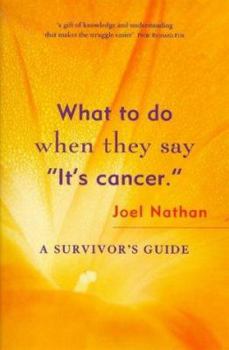What to Do When They Say Its Cancer.: A Survivors Guide
A self-help book to guide and inform cancer patients, their families, loved ones, carers and doctors through the physical and emotional ordeal of cancer from diagnosis onwards, focusing on mainstream... This description may be from another edition of this product.
Format:Paperback
Language:English
ISBN:186448635X
ISBN13:9781864486353
Release Date:January 1998
Publisher:Allen & Unwin Academic
Length:310 Pages
Weight:1.16 lbs.
Dimensions:0.8" x 6.0" x 9.1"
Customer Reviews
2 ratings
The book to read - even if you don't have cancer.
Published by Thriftbooks.com User , 25 years ago
The author - a three times cancer survivor - faces the hard questions and myths confronting every cancer patient with honesty and common sense. Through his own considerable experiences and those of his patients, he helps remove some of the panic and show how people with cancer and their family members can take control from the start. It is an easy to read book and covers all the issues that occur during the critical weeks and months after a diagnosis of cancer. It is written in five parts: Part 1 deals with understanding and confirming the diagnosis, why you need a cancer specialist and how to find one, and very importantly, how to break the news - especially to children. It lists key questions to ask your doctor and how to go about getting a second opinion Part 2 deals with how to be a survivor, weighing up alternative treatments, and describes the various treatments available and their side effects. I was particularly impressed with the author's sensitivity in the way he discusses the issues of sexuality and feeling. Part 3 deals with your rights, what are you entitled to in law, and the hotly-debated issue of euthanasia. Part 4 deals with the mind-body connection,the impact of stress and how to deal with it. I was particularly impressed by the author's meditations and the manner in which he presents them. How to make the most out of life in the face of death is, for me, the most compelling part of this book. Part 5 provides a list of notes and resources that can be used as reference. To make it even easier for the reader, it is also well indexed. I have read many books on cancer, and this is, to my mind, the best.
The best book I've read on cancer
Published by Thriftbooks.com User , 25 years ago
Having some years ago identified the stunned mullet syndrome affecting the cancer patient upon diagnosis I welcome Joel Nathan's "What to do when they say `It's cancer" as the most steadying influence the patient (and family) could be given at this point. His first advice is `to press the pause button', regain control, don't rush into treatment. Having also known the indignity of the experience, he knows the value of dignity, and the importance of hope - early. The subtitle's claim of being "A survivor's guide' is a very modest one for it provides more common-sense, practical, useful information than has so far been assembled. The bibliographical notes indicate a more than unusually informed mind on the wide scope of this subject. Writing out of experience as a three-time survivor, first with leukemia, 13 years later with lung cancer, and then with a recurrence of his leukemia, and altogether free from any hint of `schmaltz', Nathan has avoided the all too often extravagant claims of other survivors who maintain their way is the best way, even the only way. The book is not hyped as ` inspirational'. It has substance, pabulum. This is a very readable book, but it is not only for the patient. The author's insights into the professional world of the practitioner, of all brands, is extremely useful, with much to be learned by those who rely only their skills and knowledge and who lack awareness of the significance of the right relationship with the patient. Nathan's advice is to find the right door, get a second or third opinion. In this area, as throughout, there are specifics, practical down-to-earth ideas and observations. The book has a very balanced chapter on alternative medicine, the author's wisdom born from his own struggle with leukemia. In desperation he had been induced to try dozens of alternative treatments, so he has an understanding of the cancer patient's vulnerability. His advice is wise and uncompromising: demand the facts, the evidence; be warned of the consequences of abandoning conventional treatment; know the myths, the origins and the track record. It would be difficult to suggest any area of the cancer patient's needs that has not been addressed. Diagnosis and treatment are only two of the matters the patient is concerned with. Within those two headings there are sub-headings of great significance: psychological reaction and understanding your feelings, options and alternatives, patient's rights, side-effects, collaboration with your medical team, sexuality, stress and the immune system, caring and support, death and dying, living in the meantime. This a readable, informative, practical book that will be of immense value to all involved in the care of the cancer patient. It provides the information and wisdom to prevent drama turning to tragedy. The sooner people read it, the better. Not only the patient; the husband of a patient recently said of the chapter on carers





